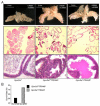GPRC6A regulates prostate cancer progression
- PMID: 21681779
- PMCID: PMC3183291
- DOI: 10.1002/pros.21442
GPRC6A regulates prostate cancer progression
Abstract
Background: GPRC6A is a nutrient sensing GPCR that is activated in vitro by a variety of ligands, including amino acids, calcium, zinc, osteocalcin (OC), and testosterone. The association between nutritional factors and risk of prostate cancer, the finding of increased expression of OC in prostate cancer cells, and the association between GPRC6A and risk of prostate cancer in Japanese men implicates a role of GPRC6A in prostate cancer.
Methods: We examined if GPRC6A is expressed in human prostate cancer cell lines and used siRNA-mediated knockdown GPRC6A expression in prostate cancer cells to explore the function of GPRC6A in vitro. To assess the role of GPRC6A in prostate cancer progression in vivo, we intercrossed Gprc6a(-/-) mice onto the TRAMP mouse prostate cancer model.
Results: GPRC6A transcripts were markedly increased in prostate cancer cell lines 22Rv1, PC-3, and LNCaP, compared to the normal prostate RWPE-1 cell line. In addition, a panel of GPRC6A ligands, including calcium, OC, and arginine, exhibited in prostate cancer cell lines a dose-dependent stimulation of ERK activity, cell proliferation, chemotaxis, and prostate specific antigen and Runx2 gene expression. These responses were inhibited by siRNA-mediated knockdown of GPRC6A. Finally, transfer of Gprc6a deficiency onto a TRAMP mouse model of prostate cancer significantly retarded prostate cancer progression and improved survival of compound Gprc6a(-/-) /TRAMP mice.
Conclusions: GPRC6A is a novel molecular target for regulating prostate growth and cancer progression. Increments in GPRC6A may augment the ability of prostate cancer cells to proliferate in response to dietary and bone derived ligands.
Copyright © 2011 Wiley Periodicals, Inc.
Figures







Comment in
-
Re: GPRC6A regulates prostate cancer progression.J Urol. 2012 Nov;188(5):2016. doi: 10.1016/j.juro.2012.07.066. Epub 2012 Sep 20. J Urol. 2012. PMID: 23059254 No abstract available.
References
-
- Sadar MD, Hussain M, Bruchovsky N. Prostate cancer: molecular biology of early progression to androgen independence. Endocr Relat Cancer. 1999;6:487–502. - PubMed
-
- Giovannucci E, Liu Y, Willett WC. Cancer incidence and mortality and vitamin D in black and white male health professionals. Cancer Epidemiol Biomarkers Prev. 2006;15:2467–72. - PubMed
Publication types
MeSH terms
Substances
Grants and funding
LinkOut - more resources
Full Text Sources
Other Literature Sources
Medical
Miscellaneous

